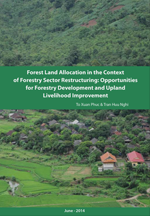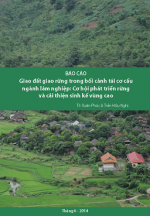Forest Land Allocation in the Context of Forestry Sector Restructuring: Opportunities for Forestry Development and Upland Livelihood Impact
By To Xuan Phuc, Tran Huu Nghi - Forest Trends, Tropenbos International Viet Nam View PublicationThough Vietnam’s Forest Land Allocation (FLA) policies have been in effect for more than a decade, a systematic assessment of FLA impacts on forest resources and the livelihoods of forest-dependent communities has never been carried out. This report shows that forest land allocated to households tends to be used efficiently in protected areas, whereas land allocated to forest companies generally fails to generate positive outcomes. Common problems are excessive land clearance for collection of land leasing fees, land conflicts between forest companies and local people, and local people lacking sufficient agro-forestry land to meet livelihood needs. State-forest enterprises or forest companies have been prioritized in the allocation of land use rights, which has decreased the area of forest land stocks available to households and individuals. Almost 300,000 households lack sufficient land; meanwhile, more than 2 million hectares of forestland currently managed by local Commune’s People Committees is under poor management. The authors recommend that steps be taken to decentralize natural resource use and management, not only through policy but also through direct on-the-ground mechanisms that promote livelihood opportunities.


